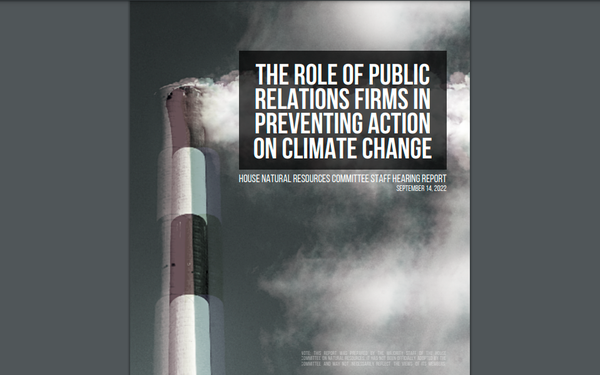
Award-winning campaigns by big ad agencies and PR firms,
including IPG’s UM unit, made it into the Congressional record this week -- but not necessarily for reasons they would have asked for.
The campaigns were cited as examples of
work done to “greenwash” the oil industry in a report compiled by the House Natural Resources Committee Staff in preparation for oversight committee hearings his week on the role that
agencies play in preventing action on climate change.
The citations -- which were lifted directly for the agency and PR firms industry awards submissions -- show how they utilized
strategies and tactics to represent fossil-fuel clients as doing more for clean energy than their actual records would show, or as an expert witness during one of the hearings this week put it (see
related story in today’s edition), “over-indexing” the public reputations of fossil fuel companies, especially Big Oil.
advertisement
advertisement
In the case of UM, the client was the
“Unexpected Energy” campaign executed for client ExxonMobil, and the tactics used was mainly a native advertising campaign produced The New York Times brand content studio and published in
the paper in a way that might not be distinguishable from average readers as being paid content.
“One example of this is Universal McCann’s (UM) 12-week campaign for
ExxonMobil in The New York Times, launching content across all NYT platforms simultaneously,” the report reads. “The campaign objectives were to ‘drive awareness of
ExxonMobil’s commitment to the research and development of lower-emissions energy through next-gen biofuels,’ ‘develop positive brand perception of ExxonMobil through their efforts
as a forward thinking and responsible company,” and “increase favorability of primary audiences’.”
The report documents how UM worked with the Times’
“T Brand marketing group” to create native content in a “Timesian voice” that “would feel ‘native to the publication,’ and which mirrored the award-winning
journalist of the world renowned publication [to ensure] authenticity, credibility and relevance.”
Among other things, the campaign included a “first-ever consecutive
‘Science Times’ print takeover, and interactive long-form journalistic-style article, CGI, print spreads, audio spots in top-rated ‘The Daily’ podcast, online ads, social
posts, and most notably, a pair of one-minute hero videos.
“This ensured the target audiences would be reached with the same messaging across multiple platforms in an array of
creative formats.”
On the downside, UM’s citation in the Congressional report may prove embarrassing, coming at a time when it and other big agencies are pushing a
sustainability agenda, including more sophisticated ways to make carbon-neutral or carbon reducing ad buys, as well as adopting practices within their own organizations to combat climate change.
On the upside, the report demonstrates incredible ROI (return on investment) for the campaign UM executed for ExxonMobil, which delivered on its objectives of delivering a “10% lift
in brand favorability” for ExxonMobile for a mere $5 million media buy.
The report, which can be downloaded here, provides other documentation of awards-submissions by agencies and PR
firms working to lift the “green” brand perceptions of fossil fuel marketers beyond what their actual actions might otherwise merit.
The report, which was published in
September in advance of this week’s hearings, did not address some of the most egregious examples of agency work for the fossil fuel industry, including some less-than-transparent
“opposition” campaigns utilizing “third parties,” including fake "grassroots" organizations and social media followers to offset or directly disrupt efforts by climate action
advocacy groups.
During one of the hearings on Wednesday, several representatives referenced one notable example, public affairs agency FTI
Consulting, which has so far defied a Congressional subpoena to submit information and testify to Congress.
“For all we have seen here today, I know there is more. And
it’s worse,” subcommittee chair Katie Porter said at the conclusion of the hearing on “The Role of Public Relations Firms in Preventing Action on Climate Change.”
“We initiated the subpoena process for FTI Consulting, which has one of the worst reputations in the business,” she continued. “The negotiations are ongoing. The trajectory
is, sadly, not good. What are they trying to hide?
“Is it their creation of fake grassroots groups for their clients to hide behind? Was it the creation of fake social media
profiles to track the plans of activist groups? Or is there something worse?”